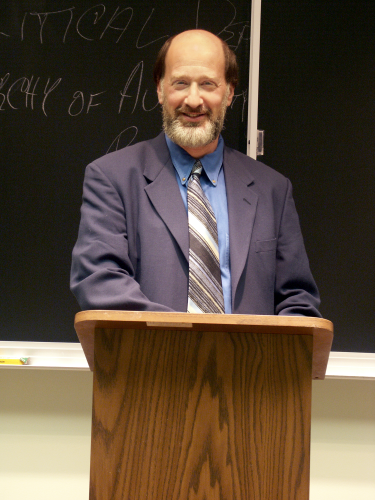Dec 04, 2008
DePaul International Bioterrorism Expert Barry Kellman Proposes Strategy to Reduce Danger in Wake of Congressional Report
DePaul International Bioterrorism Expert Barry Kellman Proposes Strategy to Reduce Danger in Wake of Congressional Report
Barry Kellman, a law professor and director of the International Weapons Control Center at the
Kellman, who has assisted international efforts to counter bioterrorism threats and is the author of “Bioviolence—Preventing Biological Terror and Crime” (Cambridge University Press, 2007), praised the report for increasing congressional and public attention to these threats. “The commission asserts that biological terrorism is one of the greatest threats facing the
Kellman is heading a government-backed study to assist policymakers in defining and implementing policies for reducing biological threats globally. The study asserts that dangers associated with malevolent infliction of disease (bioviolence) are inherently international in scope and, therefore, demand multilateral action.
Kellman suggests a four-pillar plan that addresses biosecurity, detection and interruption of
biothreats, rapid response and reasonable state behavior. Specifically Kellman proposes:
Biosecurity—Create biosecurity initiative that coordinates governments and international and professional organizations to establish sustainable biogovernance and build capacity for enhancing biosecurity. The initiative would advance harmonized, mandatory international standards for: pathogen and laboratory security; registration and reporting mechanisms; transfer and transport of pathogens including chain-of-custody tracking; data integration; and oversight of potential dangerous bioresearch.
Detection and Interruption—Promote detection and interruption of intentional biothreats by improving information integration and analysis among law enforcement, public health, science, military and intelligence. Coordinate international organizations with specialized information and expertise to improve detection capabilities.
Rapid Response—Promote rapid and effective response through improved disease surveillance, early warning and medical countermeasure delivery to limit disease consequences—whether intentionally inflicted or natural. Establish multinational biosurveillance and sensing capabilities; first-responder teams; and vaccine rapid-delivery platforms.
Responsible State Behavior—Promote responsible state behavior by discouraging the development of biological weapons programs and rewarding positive security policies. Build on the Biological Weapons Convention to establish governance modalities for state implementation of multiple bioviolence threat reduction policies, international harmonization of processes and compliance standards, and encouraging global progress in the biological sciences and public health.
Kellman suggests 21 new initiatives within these pillars. “The initiatives highlight an ambitious agenda,” he said. “Each initiative is more doable and more effective as other initiatives are realized. Initiatives which require the rest of the world to be engaged must incorporate priorities that are widely viewed as critical, including sustainable development, promotion of public health and the advancement of science.”
The
Kellman can be reached until Dec. 8 at 011 41 76727 811 or by e-mail at bkellman@depaul.edu. After Dec. 8 he can be reached at 847/708-8765 or by email. For more information about the center visit its Web site at www.law.depaul.edu/centers_institutes/iwcc/.

Caption: Barry Kellman is the director of the International Weapons Control Center at the DePaul University College of Law and the author of BIOVIOLENCE—Preventing Biological Terror and Crime.
